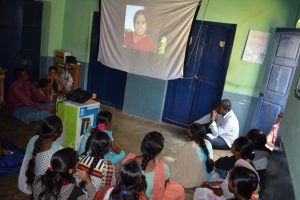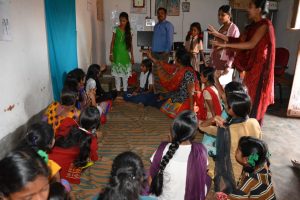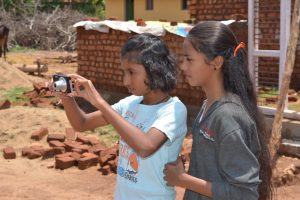
In Kannada, there is a proverb “When two women come together, the household is ruined”. This proverb is not just an illustration of the deep-rooted misogyny in our culture but it is also a sharp comment on the way patriarchal structures practice ‘divide and rule’ over women. As facilitators of learning dialogues with adolescent girls that aim at strengthening their agency, autonomy and leadership, we feel that our experience of implementing Phase 1 of the training programme makes us want to come up with a new proverb “When women and girls come together, the the house of patriarchy is shaken up”. Our experience over the past 6 months has revealed to us the extraordinary power of dialogue in enabling girls to question the gender norms, gender scripts and gender relations that were normalised in their socialisation process – thus challenging the discursive hold of patriarchy on their imaginations.
When we started out, we had to invest a lot of effort in establishing rapport with the families of the girls, and then convincing the girls themselves that this was not a boring ‘academic’ class but a fun, new space for group discussion. As we had expected, the Icebreaker exercises that focused on using digital photography and Table PCs attracted a lot of interest from the girls. They were not just excited by the opportunity to handle digital artefacts; they were also happy about how the homework assignments we gave them (to take photographs of women’s work and men’s work; and to interview individuals in their community about their idea of what a woman’s role is) gave them an opportunity to step outside their homes. However, this exercise was not able to break caste-lines – lower-caste girls did not visit upper caste-neighbourhoods or speak to members of these groups. This is something we have to still figure out.
Kishoris interviewing people from their village on roles of men and women
The session on gender roles opened up a number of frank conversations. Girls spoke about how women’s work is never seen as ‘work’ but men’s work is always seen as very difficult. Most girls found the discussion we initiated during this session – on the place assigned to women in traditional proverbs – an eyeopener. There were heated debates about the accuracy of the proverbs, with discussions breaking out about how stereotypes color our views of reality.

In the session on mobility and public participation, girls shared their frustrations about not being able to fulfill some simple desires such as sitting on the aralikatte (public platform in the village). As one girl put it, “it is perfectly acceptable for boys to aimlessly wander around the village and even loiter in the streets. But if a girl merely steps out of her house, the people will label her a gandbeeri (shrew)”. Some girls also shared the bitterness they felt when constantly bombarded with myths about menstruation. It is popularly believed to be the monthly curse upon women, and menstrual cramps are considered just punishment for one’s sins.
The session on rights was more difficult to transact. When we were explaining the constitutional guarantees for women’s rights and introducing the idea of ‘formal’ and ‘substantive’ equality, some girls opined “what good will the laws do until the older women and men in our communities change and respect our rights?” Another reflection from the girls was that learning about their rights had made them confused, as they had never thought of questioning existing structures of gender, prior to these trainings.
We had many conversations outside the training space, some of which were challenging for us to facilitate. For example,one of the participants is permitted a lot of freedom by her parents. She told us proudly in every discussion that she did not face any of the challenges that the other girls reported, as her father had decided to raise her like a son (as she was the youngest among three sisters, and had no male sibling). When we asked her why she couldn’t be entitled to the same freedoms even if her father had decided to raise her like a daughter, she was flummoxed. It was difficult for her to imagine that girls deserved the same freedoms that boys had. At the time the blog is being written, T.. is still working through this question. Similarly, W………. aspires to be a TV actress but is also uncomfortable about the associated requirements of donning Western clothes – and we opened up a conversation to push her to reflect on the norms about dress. Another girl D……..who is almost 18 years of age and is engaged to be married told us that the session had made her question her own assumptions about marriage being the end-goal of life for girls. She said that she was now keen to negotiate with her in-laws to take up some skills-training that would enable her to earn her livelihood and become more independent.

What we take away from this experience is that as facilitators, we cannot shy away from the responsibility of enabling girls to negotiate within their families and with community members for their rights; and helping them gain the strength that is essential to continue walking on this critical and arduous ‘education-for-empowerment’ journey.
We were stuck by the perceptiveness of the girls, and their willingness to go through the hard process of deconstructing social experiences and take this to its logical conclusions. As one girl commented after viewing the film ‘69’ that shows a world of topsy-turvy gender relations, “what we want is not a world where women will oppress men! We want a world where both women and men will treat each other with respect”.
In Phase 2 of this project, we will focus on triggering processes that can help the girls carry forward this dialogue with members of their communities – and initiate public conversations on issues around which there is usually no discussion – dreams and aspirations of adolescent girls, their right to mobility and freedom and violence and so on.